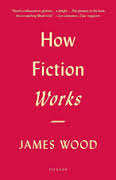Wood, James (2008). How Fiction Works. New York: Picador/Farrar, Straus, Giroux.
This beautifully manufactured little paperback surveys the main points of novel writing craftsmanship, such as characterization, point of view, metaphor, dialog, and so on, but does so in such a thoughtful, insightful, and subtle way that the result verges on philosophy.
He characterizes the history of the novel as, in large part, the creation and development of the free indirect style of narration, in which the narrator temporarily merges into the consciousness of the character. For example, “He looked at his wife. Yes, she was unhappy again, almost sick. What the hell should he say?” (p.9) Who said “Yes?” Was it the husband or the narrator? Both.
This kind of narrative trick is familiar to most writers, but Wood goes on to analyze many variations of free indirect style and how they subtly differ. “So the novelist is always working with at least three languages. There is the author’s own language… ; there is the character’s language, style, perceptual equipment, and so on; and there is the language of the world – the language that fiction inherits before it gets to turn it into novelistic style, the language of daily speech, of newspapers, of offices, of advertising, of the blogosphere and text messaging” (pp. 34-35).
The whole book is thought-provoking. Wood makes a convincing case that the history of novelistic description can be characterized as either pre- or post- Flaubert. He is less convincing in batting down anti-realist arguments of the postmodernist movement. There he is jousting at straw dolls, not the most formidable arguments. Still, it is all fascinating.
On the down side (for me), Wood assumes you really know your Western novelistic literature quite well. He gives many excellent examples for the points he is making, from Shakespeare, Melville and Austen to Bellow and Pynchon. But sometimes he assumes a lot: “Consider three men, each permanently affected by a chance occurrence: King David in the Old Testament, Macbeth; and Raskolnikov in Crime and Punishment…” (p. 140). That’s a bit of a stretch for me.
Nevertheless, this book is so thoughtful and interesting, it makes me motivated to go back and catch up on the literary education I never had.

